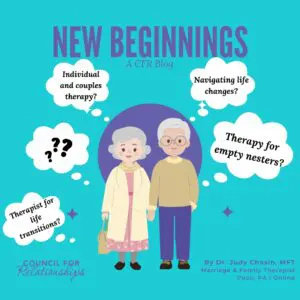New Beginnings with a Therapist for Life Transitions
September traditionally marks the start of the school year. For many people, the changing colors of the leaves and a new crispness in the air bring excitement. They inspire thoughts about new beginnings and the days ahead. It can be a busy time for some of us. Additional demands on our time and energy often replace the final days of summer. For others, it may bring feelings of emptiness. The changes that accompany a new school year can result in less time with those we hold dear. Whether you’re an empty nester seeking therapy, navigating life changes in your family or career, or have interest in working with a therapist for life transitions, this season can be a meaningful time to consider individual and couples therapy.
Therapy can be a way to pause and realign with your values. When life moves quickly—or not at all—it’s easy to lose touch with what matters most. A supportive therapeutic relationship can help you regain clarity, process change, and move forward with intention.
The sense of wonder and excitement that so many of us feel as we embark on something new can sometimes also be tinged with feelings of uncertainty about what lies ahead of us. We can’t always tell whether we will handle the situation successfully.
At times of transition, it can be helpful to set aside space for reflection. These moments create opportunities to make intentional choices for the benefit of ourselves and our relationships. Therapy can provide a unique and safe place for exploration during such moments. Sharing this journey with a therapist for life transitions who really sees and hears you can be both powerful and empowering.

Get matched with a CFR Therapist or Psychiatrist today.
Anticipated Shifts: Therapy for Empty Nesters and New Parents
Perhaps you are a parent sending your little one off for their first day of kindergarten. Are there things you can do to support their adjustment? What memories of your own childhood school experiences are awakened?
Or you may be a parent sending your youngest child off to college. What is the best way to support their continued growth and development? How will you find a comfortable balance and stay connected in a way that honors your child’s needs as well as your own? What does it mean for you (and your partner) to have an “empty nest”? Therapy for empty nesters can be a meaningful space to explore these shifts.
Of course, you may also be the young adult launching into a new phase of life—having just completed high school, college, or trade school. You may be beginning a new job or relationship and looking for support from someone outside of your family.
Maybe you are anticipating welcoming a child or grandchild into your family. What will the addition of a new family member mean for your relationship with your partner and/or other children? How will the siblings get along? What does becoming a grandparent mean as you think about your identity and sense of self? How will it impact your relationship with your own adult child? How will family members juggle their various personal and professional responsibilities when a new family member is added into the mix?
How a Therapist for Life Transitions Helps You Stay Centered
When life moves quickly—like it often does during family changes—a therapist for life transitions can help you slow down and reflect. Whether you’re adjusting to a quiet home, shifting routines, or new roles as a parent or grandparent, therapy offers space to stay emotionally present. It can be especially grounding when everything around you is in flux.
In each of these familiar scenarios, you may be experiencing a wide range of feelings and reactions as you navigate a new phase of life. The impact it will have on your identity and your relationships with others may take time to fully understand. Even though these are often seen as positive developments, there can be bittersweet feelings—and sometimes sadness or fear. Letting go of the past while looking to the future can be emotionally complex, especially when you’re also trying to stay grounded in the present.
When a Therapist for Life Transitions Can Support Positive Milestones
Support from a therapist for life transitions can be especially helpful during these milestone moments. Together, you and your therapist might explore what you are letting go of, what you want to carry forward, and how your relationships are evolving in response to change.
Navigating Life Changes You Didn’t See Coming
We don’t welcome or plan some transitions—they arrive through loss, uncertainty, or disruption. These experiences can bring up fear, sadness, and self-doubt, even for those who are typically resilient.
You may find yourself at a crossroads in your work, contemplating a midlife career change. Or perhaps you have realized that patterns of relating to others once worked but are no longer sustainable or effective in your partnership or family. It is courageous to take stock of where you are and think about where you want to be. Changing course to move closer to the dreams and goals you hold for yourself is not always easy—but it is possible.
Of course, sometimes the changes you encounter are unanticipated and unwelcome due to factors beyond your control. For instance, you may experience a change in employment status or earnings. Or you may face the diagnosis of an illness or disability in yourself or a loved one, or be grieving the loss of an important relationship due to separation, divorce, or death.
Navigating life changes like these can be overwhelming. Establishing an opportunity to slow down racing thoughts and worries during therapy sessions with a trusted and caring professional can help you to access internal and external resources. It also gives you space to practice new coping skills and further develop your resilience in the face of challenges.
Therapy for Clarifying Choices in Uncertain Times
Many people feel trapped when either current circumstances or prior experiences leave them believing that they have few choices and limited control. For others, feelings of paralysis may develop when there seem to be an overwhelming number of options.
Figuring out which choice to make becomes nearly impossible. The process of discernment is one which can be practiced in therapy. Rather than reactivity, balance can be found by slowing things down, carefully evaluating options, and making an intentional choice guided by reason and informed by emotions. This is one way individual and couples therapy can offer tangible support.
Individual and couples therapy can also help you identify patterns that may be rooted in earlier experiences. Together, you can explore how those patterns influence the way you engage with current circumstances. You don’t have to wait for a major crisis to seek support—therapy can be a proactive space for exploring possibilities.
Navigating life changes doesn’t mean navigating them alone. Having someone walk alongside you, ask good questions, and hold space for uncertainty can help you regain a sense of groundedness and choice.
How a Therapist for Life Transitions Can Help
Therapy can be a valuable space to bring together reflection, intention, and growth. As our lives change, so do our internal narratives, our relationships, and our needs. Understanding these shifts with the help of a trusted professional can lead to powerful insights.
Many psychological theories and models have been developed over the last century. These help to explain the unique challenges faced by, and the resources available to, individuals, families, communities, and larger societal systems during times of change.
Perhaps you’ve seen Maslow’s hierarchy of needs, which conceptualizes human needs using a pyramid with basic physiological needs (food, shelter) at the bottom. The levels above include safety, predictability, love and belonging, esteem, and realizing our full potential.
Or you may be familiar with well-known stage theories of development (for example, Erikson). These theories describe the unique challenges and opportunities that children and adults face throughout life. You may have heard about different personality types or attachment styles and wonder about your own.
As the field of psychology grew, many clinicians and researchers recognized the importance of looking beyond the individual. They sought to understand the impact of relationships and connections among family members and with those in the larger community. Therapists use these “systems” theories and approaches to bring additional tools and resources to their work with clients.
As a therapist for life transitions at Council for Relationships, I use an integrative approach, based on my training. I incorporate both evidence-based research and clinical wisdom, drawing upon the wealth of available knowledge, to tailor therapy to each client’s unique concerns, needs, and strengths.
Applying Insight to Create Change
Individual and couples therapy can help you better understand yourself and those around you, strengthen your relationships, and develop a more compassionate and empowered sense of self. This kind of work takes time—but it can be deeply rewarding.
Learning more about yourself and your relationships in therapy may help you widen your perspective, deepen your understanding, and navigate life changes with greater calm and clarity. Ultimately, you can begin to make more informed and deliberate choices about the things that are within your control. And in doing so, you may find a stronger sense of connection—to others, and to yourself.
Editor’s Note: The views expressed in this blog are those of the author and do not necessarily reflect the official policy or position of Council for Relationships.

Contact Dr. Chasin for a free 15-minute therapy consultation.
About Paoli, PA Therapist Dr. Judy Chasin, MFT
Judy Chasin, PhD, MFT, is a pre-licensed Marriage and Family Therapist at Council for Relationships. She specializes in helping adults and couples navigate life changes with greater understanding, connection, and intention.
Judy’s clinical approach draws from psychodynamic, emotionally focused, narrative, and systems-based models. She is especially passionate about supporting people through transitions such as parenting shifts, relationship challenges, grief, and personal growth. Whether you’re experiencing expected milestones or sudden disruption, Judy offers a compassionate space for healing and clarity.
She provides individual and couples therapy both in person at CFR’s Paoli, PA office and via secure telehealth for adults across Pennsylvania.
If Judy’s approach resonates with you, request an appointment with this experienced therapist for life transitions.
More from CFR
Looking for the right therapist? Get matched with a CFR clinician today. Whether you’re starting therapy for the first time or returning after a break, we’re here to support you with expert individual and couples therapy options across Pennsylvania and New Jersey.
Curious about how therapy can support you during periods of change? Read more insights from our team of clinicians on the CFR Blog, featuring topics like grief, parenting, relationships, and identity.
Want updates on seasonal topics, new blog posts, and mental health resources? Sign up for our newsletters and get guidance from therapists for life transitions, parenting experts, and couples specialists delivered straight to your inbox.
